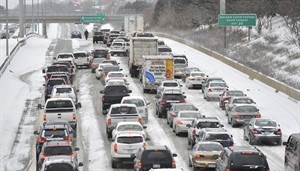
The westbound Interstate 696 is closed at Groesbeck Highway due to numerous accidents, Sunday, Jan. 26, 2014, on I-696 in Roseville, Mich. (AP Photo/Detroit News, Robin Buckson) DETROIT FREE PRESS OUT; HUFFINGTON POST OUT.
January 27, 2014 - 4:35 AM
CHICAGO - Another winter day, another below-zero high temperature for many parts of the Midwest — at least, it seems that way. The deep chill has returned, bringing with it wind chills ranging from the negative teens to 40s, school cancellations and sighs of resignation from residents who are weary of bundling up.
A persistent weather pattern that's driving Arctic air south was forecast to force temperatures to plummet for about 2 1/2 days, starting overnight Sunday. Actual temperatures will range from the teens in northern Kentucky to double-digits below zero in Minnesota, but even colder wind chills were expected — minus 43 in Minneapolis, minus 23 in Chicago, minus 18 in Dayton, Ohio, minus 14 in Kansas City, Mo., and minus 3 in Louisville, Ky.
"I'm sick of it," Chicago resident Matt Ryan, 19, said Sunday on his way to his family's home in the suburb of Oak Park.
"I came home to steal a scarf from my parents," he said. Ryan's plan for Monday, when the high is forecast to be a mere minus 4 degrees and the wind chills could dip to 40 below: Dress in layers, carry hand warmers and wear long underwear.
National Weather Service Meteorologist Scott Blair stopped short of calling the latest round of cold part of the polar vortex, a system of winds that circulate around the North Pole.
"There's really nothing abnormal about the air that's coming into the area," he said. "It's just been a very persistent pattern" of cold air.
Blair said it's an amplified pattern of the jet stream, with cold air filtering in behind a large trough of low pressure. Simplifying, he explained: "Troughs are typically associated with unstable or unsettled weather, and, at this time of the year, much colder air."
Frigid temperatures are expected to hold into Tuesday. If Chicago makes it to 60 hours below zero, it will be the longest stretch since 1983 — when it was below zero for 98 hours — and the third longest in 80 years.
Chicago Public Schools called off Monday's classes for its nearly 400,000 students, as did suburban districts. Earlier this month, when it was below zero for 36 straight hours, CPS closed for two days.
About 90 miles north of Chicago, Ray Fournelle lamented the weather's ability to keep him from his normal routine of jogging 4 miles a couple of times a week.
During bad weather in the past, the 72-year-old engineering professor at Marquette University in Milwaukee has walked instead. But he hasn't tried to exercise outside since last weekend. Monday's forecast predicted a high of 5 below.
"With all the snow and ice on the sidewalks, you just slide around out there. It's just rotten," he said Sunday.
In the northern U.S., North Dakota and South Dakota residents dealt with dangerous cold and wind gusts Sunday that reached up to 60 mph — blowing snow to the point where it was nearly impossible to travel in some spots. In Indiana, where 50 mph gusts were recorded early Monday, officials recommended only essential travel in more than half of its counties.
In Michigan, which has in parts experienced its snowiest January on record, expressways closed as snow and subfreezing temperatures played a role in multiple crashes Sunday; at least three people died over the weekend because of weather-related accidents.
Business is far from usual this winter for Alex Alfidi, manager at Leo's Coney Island restaurant in the Detroit suburb of Birmingham. His 24-hour restaurant been getting some carryout patrons, but the casual walk-in customers have stayed away.
"We slowed down big time," the 39-year-old said. Alfidi has logged 15 years in Michigan, and says he's seen some challenging winters.
"This is the biggest one," he said.
Even the nation's northernmost city, Barrow, Alaska, will be warmer than much of the Upper Midwest on Monday; it's expected to reach minus 4.
___
Associated Press writers Ken Kusmer in Indianapolis, David N. Goodman in Detroit, James MacPherson in Bismarck, N.D., Erica Hunzinger in Chicago and Dinesh Ramde in Milwaukee contributed to this report.
News from © The Associated Press, 2014